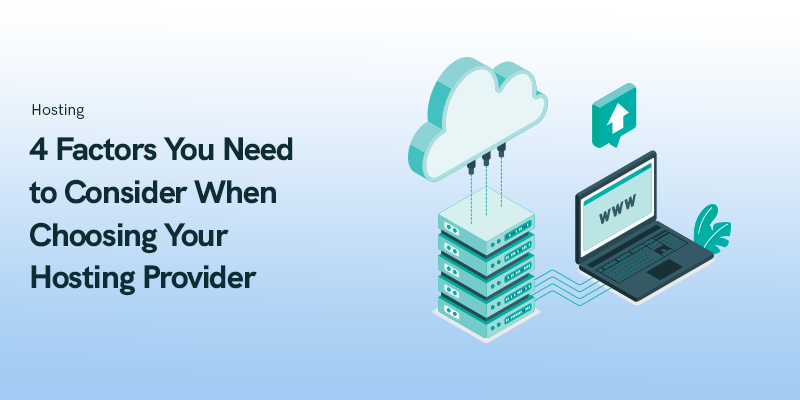
Choosing Your Hosting Provider: Cloud Computing is Revolutionizing the Gaming Industry
If you're on a quest to find the perfect hosting provider for your website, you've come to the right place.
In this blog post, we're going to walk you through the essential steps to assess hosting providers and ensure your website is in good hands.
The gaming industry has witnessed a remarkable transformation over the past decade, primarily driven by technological advances. Among the most significant of these advancements is cloud computing. Once merely a buzzword, cloud computing has become a cornerstone of modern gaming, offering a range of previously unimaginable benefits.
From enhancing multiplayer experiences to streamlining game development processes, cloud computing is reshaping the landscape of the gaming industry in profound ways.
To understand the full impact of this revolution, it's essential to delve into the various ways cloud computing is changing gaming. To learn more about the practical applications and benefits, you can explore a collection of case studies.
Enhancing Multiplayer Gaming
Multiplayer gaming has been a long-standing genre of gaming that has had its fair share of problems, such as lag, server stability, and update problems.
These problems are solved with cloud computing, which offers efficient server solutions. Conventional MMGs are games that use diverse physical servers to handle multiple players, an approach that is often costly and vulnerable to frequent outages.
Cloud servers are more versatile and can adjust the resources provided to meet the need, so players won’t suffer from slow action and connection interruptions.
Indeed, one of the most critical aspects of cloud computing in multiplayer gaming is handling large data sets in real-time. This capability is also essential to deliver an embedded and engaging gaming environment.
For example, the use of cloud servers in implementing an MMOG game is advantageous since it allows thousands of players to connect to the game simultaneously while still providing a seamless experience.
Furthermore, the cloud servers can be located in different regions so that players can connect to the nearest to them, which helps improve the game's performance.
Furthermore, it also means that games and their patches can be updated in the cloud continuously without the need for bulky file downloads. Other updates are server-side ones, so all the players will see the new version of the game right away.
This not only improves the gaming quality but also avoids the possible splitting of players’ groups due to the differences in the game versions.
Streamlining Game Development
Cloud computing has also greatly impacted game development, changing the way it is done.
It is noteworthy that creating a game is a time-consuming and cost-consuming process that includes many steps: designing, coding, testing, and deploying.
Modernization also eases many of these phases, and developers can give more attention to making an innovative software product rather than worrying about the underlying architecture.
Another way through which cloud computing boosts game development is through the integration of the teamwork approach. It is standard for game development to include people in different places and time zones, and cloud tools enable real-time collaboration.
For instance, cloud storage allows developers to upload and share large files without difficulty, and cloud version control systems allow many developers to work together on the same project without possibly coming up with different results.
It also allows for the use of high-performance computational resources that can considerably speed up the development process.
Tasks that demand a lot of computational capability, like real-time graphics rendering or simulations, can be handed over to the cloud. This saves the time that would have been used to do these tasks and a lot of funding that would have been sunk into the hardware.
Also, cloud computing can enable the new methodology of continuous integration and continuous deployment (CI/CD), which is crucial for contemporary game development.
Continuous Integration/Continuous Delivery processes are implemented in software delivery and ensure that changes made by developers are tested and can be deployed when there are no problems.
This results in more stable and polished games being developed and released into the market, hence improving the quality of games being made.
Increasing Opportunities and Games on offer
Cloud computing is disrupting not only the technology of gaming but also the concepts and possibilities of gaming for players.
Cloud gaming is another significant innovation in this area and refers to gaming-as-a-service. Cloud gaming is the concept of streaming games from the cloud to a user’s device, which means that a user does not need a powerful gaming device.
Platforms like Google Stadia, NVIDIA GeForce Now, and Xbox Cloud Gaming allow gamers to play games on their smartphones, tablets, or low-end PCs with near-console-like quality.
This democratization of gaming is appealing as it ensures that more people can play games without the necessity of having the most powerful machine.
Also, cloud gaming can be taken anywhere with an internet connection, hence providing flexibility. This has made it possible for players not to be bound to a given console or PC so that they play the games in the best way they desire.
It is even more advantageous in the current generation, where flexibility, or rather the ability to move from one place to another, is considered valuable.
Customer Support
Investigating their support services can reveal a great deal about their commitment to assisting users. Here's how you can assess their customer support:
Visit the Provider's Website
Start by visiting the hosting provider's website and check if they have a dedicated customer support page.
Reliable providers typically offer robust customer support options. In contrast, unreliable ones may try to minimize customer interaction, providing only minimal support, hoping users will give up.
Take note of the types of support channels available, especially if you are looking for a reseller hosting plan, click here to find out why.
Support Availability
Ensure that the hosting provider offers 24/7 support. Some providers may attempt to charge extra fees for off-hours or weekend support, which can be a concerning sign.
Read Reviews
Explore customer reviews to assess the quality of the hosting provider's support.
Pay attention to whether complaints about “poor support” are a recurring issue. While it's not recommended to test support responsiveness with random inquiries, as it may flag your IP address as abusive, reviews can provide insights into the effectiveness of their support.
Uptime
Evaluating a hosting provider's track record of uptime and downtime is a pivotal step in assessing their reliability.
This assessment entails determining what percentage of time the hosting provider's servers remain operational. Typically, a dependable hosting provider maintains an uptime of over 95%.
To measure a hosting provider's server uptime effectively, employ online tools such as UptimeRobot, Pingdom, or Site24x7.
These tools allow you to monitor a website's uptime and downtime. Simply enter the host provider's website into these tools to observe their online status.
Security Measures
Server security is the most important consideration when selecting a website hosting provider.
Ensuring the protection of your server from DDoS attacks, hacking, and malware is vital if you want your website to function properly.
For this reason, the security measures implemented by your hosting provider directly impact your website’s reliability. Therefore, before committing to a hosting provider, you need to pay attention to these key elements:
SSL Certificate
Verify whether the hosting provider includes an SSL certificate with their hosting plan. An SSL certificate encrypts data exchanges between your website and the server.
Firewall Protection
This security measure acts as a guard, regulating traffic entering and exiting your website. It effectively blocks unauthorized access, hacking attempts, and DDoS attacks, strengthening your server's defenses.
Malware Scanning
A dependable hosting provider should conduct regular malware scans on their servers. Malware, malicious software designed to harm data or steal information, poses a significant threat.
Hosting providers that proactively detect and eliminate malware contribute to a more secure and reliable hosting environment.
Speed
While a slow-loading website doesn't necessarily indicate a bad provider, reputable hosting companies prioritize delivering fast speeds at competitive prices.
This approach attracts more clients and generates higher revenue. Therefore, when exploring hosting providers, it's essential to assess the relationship between speed and plan pricing.
So, how can you gauge whether a hosting provider offers sufficient speed? Here's a step-by-step approach:
Review Their Offerings
Begin by examining the hosting provider's website to assess what speed they promise and whether the pricing plans align with your requirements.
Utilize Speed Testing Tools
Employ a website speed testing tool such as Google PageSpeed to evaluate the hosting company's URL and other domains hosted by the same provider.
Faster website loading times not only indicate a more reliable infrastructure but also enhance user-friendliness, thereby benefiting your SEO efforts.
Evaluate Server Response Time (SRT)
Server response time, or SRT, measures how swiftly a server responds to browser requests. A slower response time may suggest inadequate server resources or current server overload.
These factors are unfavorable indicators, particularly for a hosting provider's official website.
Conclusion
It can be unequivocally stated that cloud computing is profoundly impacting gaming by improving multiplayer interactions, accelerating game-making, and opening up new opportunities.
This is especially true because the technology is highly scalable, reliable, and robust when offering game resources.
Therefore, in the future, as cloud computing develops further improvements, there will be even more diverse and exciting gaming experiences.
If the reader wants to discover the essence of cloud services utilization in gaming from a practical perspective, describing real-life examples can benefit that.
Selecting your hosting provider should never be taken lightly because choosing a dependable hosting provider plays a pivotal role in establishing a credible website.
If your website's foundation is shaky due to an unreliable hosting provider, it's challenging to thrive in the online business landscape. Whether it's frequent downtime, security vulnerabilities, or obscure pricing, unreliable hosting can negatively your website's performance.
Recommended Posts

How Can Web Hosting Make or Break the Success of an OTT Platform?
September 30, 2025

Top Reasons to Choose Managed WordPress Hosting
July 4, 2022

13 Best VPS Hosting Services in 2025
March 17, 2022
